Driverless buses hit the streets of Sion
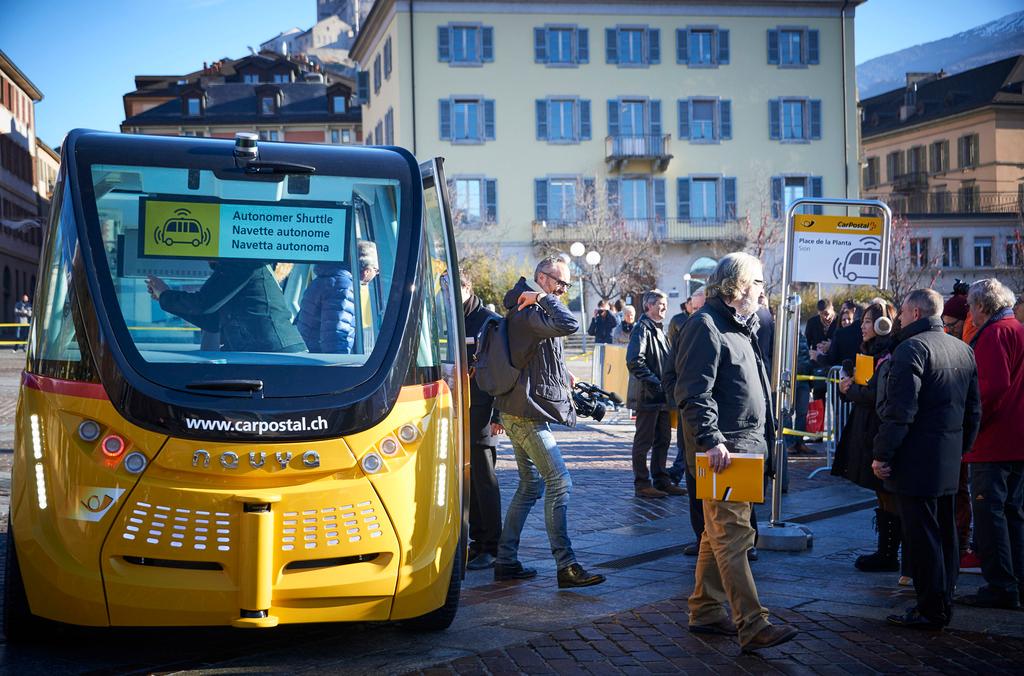
Imagine ordering a bus with your mobile phone, stepping on board and no driver being present as the vehicle shuttles you to your destination. The Swiss city of Sion moved closer to this driverless future on Thursday when it presented two autonomous buses that it is testing.
“Move along inside, there’s room for up to nine people,” says Pascal Lecuyot, our guide in one of two distinctive bright-yellow driverless buses.
The doors close with a swish. The electric-powered vehicle beeps twice and we’re off – aided by computer technology but without a driver, steering wheel or pedals.
“Hold on tight, as I’m responsible if you hurt yourself,” says our guide.
The five-metre vehicle slowly picks up speed as we cross the sun-drenched Place de la Planta with views of the snow-capped Alps. The bus can reach a maximum of 45 kilometres per hour, but at 20km/h – the speed limit in the cobbled centre – there are not many risks on the test circuit programmed for today’s demonstration.
The bus slaloms around several Christmas trees set up in the middle of the square and stops to let off passengers. We are then treated to an emergency stop as a man with a pushchair steps in front of the bus.
Thanks to banks of sensors, GPS and radar, the bus can see what is coming. It slows to a halt as the man walks past, waits for ten seconds then continues on its way to the temporary bus stop where we got on.
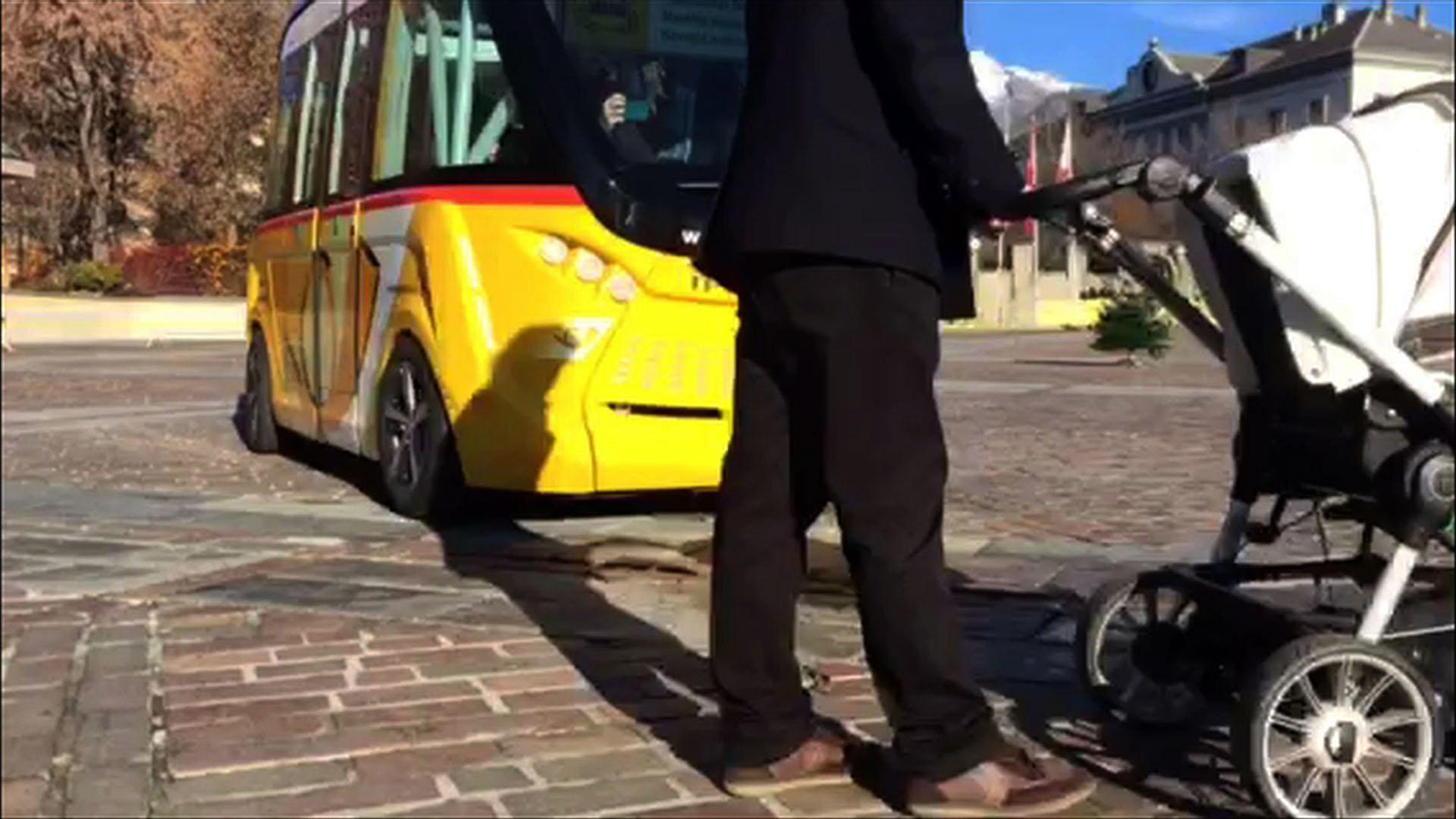
More
Safety test for the driverless bus
Today was an opportunity mainly for the media to learn about the project. Local residents and tourists will be able to start taking the buses in Sion Old Town and up to Valère and Tourbillon castles from spring 2016. For the two-year test period, journeys will be free.
The self-driving shuttles are the fruit of a collaboration between the PostBus, a wholly owned subsidiary of the national post service, and Swiss start-up BestMile, founded in 2014 by graduates from Lausanne’s Federal Institute of Technology (EPFL).
“The aim is not to replace existing bus routes but to densify the public transport system in Sion,” explained BestMile co-founder Raphaël Gindrat. “We are proposing to go where it’s complicated, where the roads are too narrow or where financially it is too expensive for the state.”
BestMile and EPFL have spent two years developing the mathematical algorithms that allow driverless vehicles to navigate roads precisely, read road signs and cope with hazards like mobile phone-reading pedestrians.
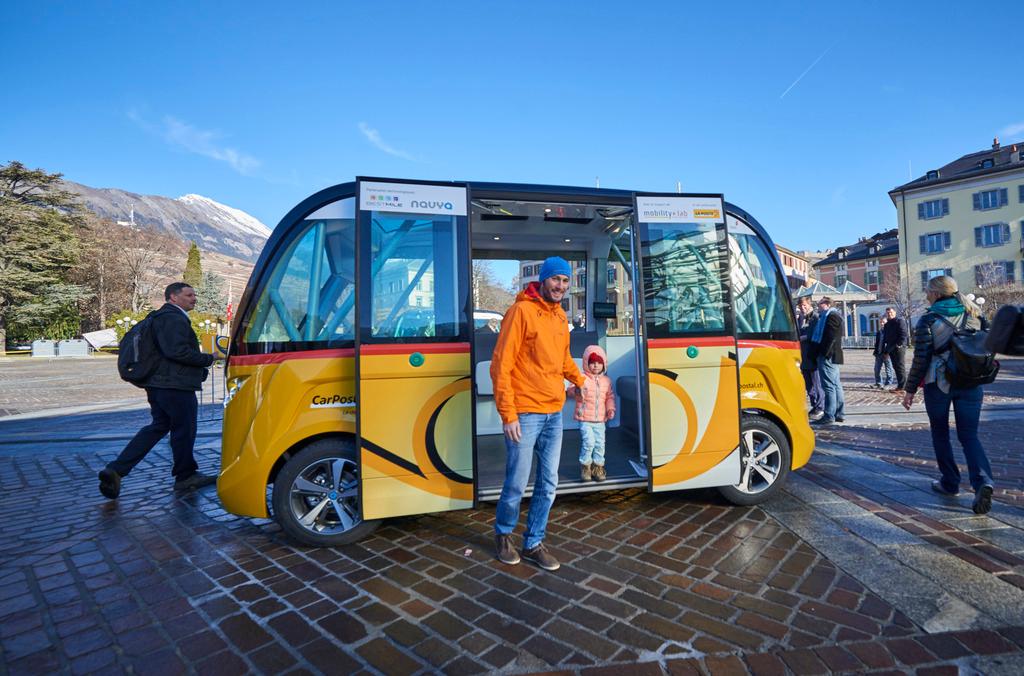
More
Developing driverless buses
Remote control
The buses are operated remotely. Software controls a so-called fleet management platform, which will allow PostBus to manage several buses moving through the city streets in real time.
During the initial test phase, a PostBus employee must be on board for legal reasons to ensure journeys go safely and to welcome clients and answer any questions.
America and Sweden have been early adopters of driverless vehicle technology. Several American states, including Michigan, Nevada, Florida and California, have granted companies autonomous driving permits.
Volvo’s green-lit “Drive Me” programme in Gothenburg, Sweden, will put 100 self-driving XC90 SUVs on public roads in 2017.
In Europe, Greece, Finland, Italy, the Netherlands and Britain are well advanced in the field of driverless bus experiments.
“But in the long term they won’t be present and a traffic control centre will be able to take decisions remotely if the vehicles are late or if the bus routes need to be modified. One person will be able to oversee up to 50 vehicles,” Gindrat said.
In the future, passengers will also be able to use a smartphone application to check the location of available vehicles and waiting times, and to order a bus with a tap of their fingers.
Gindrat said their driverless technology had improved significantly thanks to six months of vehicle testing on the EPFL campus together with Navya, a French specialist in sustainable mobility. A total of 8,000 students took a ride.
‘Too slow’
But it wasn’t an entirely smooth ride. Some EPFL students said they preferred to walk rather than take the buses, which they felt were too slow, stopping too frequently to identify objects.
Google’s driverless cars have experienced similar problems detecting objects such as rubbish and small debris and avoiding potholes. They also have problems recognising when humans, such as police officers, signal the car to stop. It is unclear how the Sion buses will cope with heavy snow, for example.
“It’s obviously very complex,” Gindrat said. “Our aim at the start is not to go at 80km/h but 20-40km/h. It’s true the EPFL vehicles stopped all the time, but technological progress has been very quick. We are moving in the right direction.”
But not everyone was impressed by Thursday’s show. While the bright-yellow livery got thumbs up, some locals felt it was too slow and questioned whether it was a good idea in the city centre.
Daniel Castella said he did not think he would use it. “For a bus, it’s rather cute. But Sion is not Zurich or Geneva. It’s a small place. I go everywhere by bike, otherwise I walk, which does me a lot of good. The bus is a bit of a gadget.”
Potential clients
Sion nonetheless represents the start-up’s first commercial customer and if it proves a success in the Old Town, other routes could be created with up to ten buses, officials say.
BestMile says it has many potential clients in the pipeline, including several in Switzerland like the city of Fribourg, as well as others in Britain, Germany, Australia and the United Arab Emirates.
It is unclear what impact driverless cars will have on Switzerland. PostBus said drivers’ jobs are not threatened and the driverless cars will offer a complementary service for areas that are typically poorly served by public transport.
“Don’t be afraid of progress,” declared PostBus Chief Executive Officer Daniel Landolf. “We will continue to operate our regular bus services with drivers even if the autonomous vehicles are on our roads.”
Rules of the road
Regulation for driving on public roads remains a big question mark, however. The technology is advancing fast, but there is a lack of clear rules and concerns over liability in the event of an accident.
In Europe, there are no laws in place to regulate the use of driverless cars. But Gindrat said the issue was on the European Commission’s agenda as “it’s a priority”.
“It will take time, but having a project like this one in Sion and showing that it works will help the laws to evolve,” he declared.
“Switzerland is more advanced than other European countries, which have just done pilots. Here we have a private company purchasing the buses and financing a project, which it is managing. It’s important to have a company like PostBus on board which is taking risks.”
Philippe Cina, coordinator of the Sion-Valais Mobility Lab, agreed that the Swiss authorities seemed open to this new technology.
“Today there are no laws or clear legislation regarding autonomous vehicles. To be able to drive with them on public roads we need a special permit. In the past few weeks we have been in discussion with the Federal Roads Office, the Federal Office of Transport and the Federal Office of Information Technology, Systems and Telecommunications to see how we can advance,” he said.
“Things are moving ahead. There is no resistance from their side. They are interested to see how with proper security and other measures we can integrate this technology in Swiss cities.”

In compliance with the JTI standards
More: SWI swissinfo.ch certified by the Journalism Trust Initiative

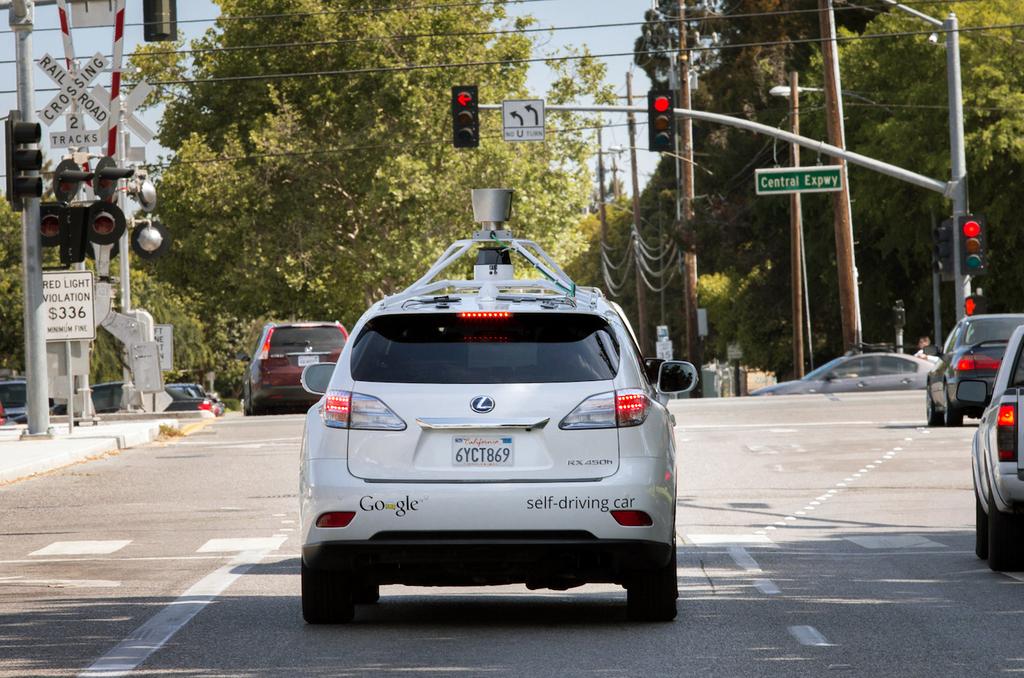
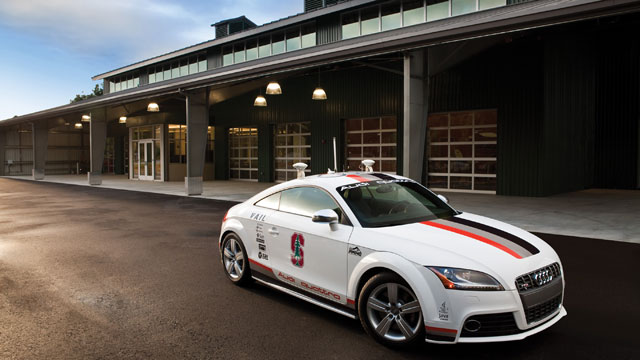
You can find an overview of ongoing debates with our journalists here. Please join us!
If you want to start a conversation about a topic raised in this article or want to report factual errors, email us at english@swissinfo.ch.